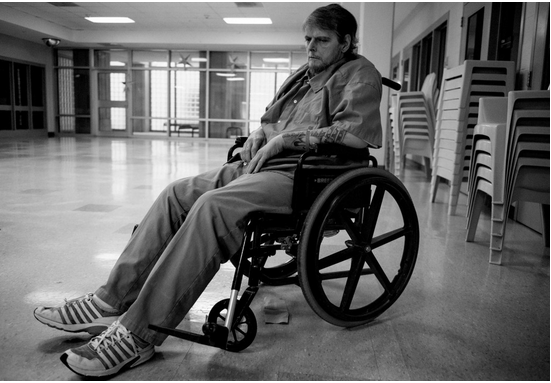
By: Kristine Alarcon
The people confined in prison are getting sicker and older. There has been a rapid increase in prisoners 50 years and older in crowded federal correctional facilities. The rate is so fast that geriatric wards or convalescent homes are needed in prisons. As a result, American taxpayers are paying for the rising health care costs associated with the elderly inmates.
The cost to maintain the health and provide medical services for an elderly inmate is about twice as much as it is to keep a regular prisoner. Taxpayers pay almost $58,956 a year to cover the medical care for an older prisoner in comparison to $27,549 a year for a general prison member. Some health care costs include wheelchair-accessible entrances, showers that the elderly can use, prescriptions drugs, treatments, and more nurses.
One prisoner, Michael E. Hodge, was convicted of marijuana and gun possession. While he served his time, he was bedridden and could not provide care for himself as a result of his liver cancer. Hodge required assistance from nurses to get out of bed, eat, and clothe himself. He was denied compassionate release for at least four occasions and died in prison.
Nurses are not the only ones hired to care for the inmates. Physical therapists, dentists, psychologists, dietitians, and social workers are also needed to check up on the health of prisoners. With more specialists needed, the higher the costs will be. With the nature of prisons where fights could break out anytime and anywhere, many medical providers prefer to stay away making it more difficult to support the health of prisoners.
The Obama administration is working towards releasing prisoners early through clemency if they meet a certain criteria. They are also pressing prosecutors to charge serious, high level offenders with more severe drug charges because a majority of the elderly inmates are convicted for less severe drug crimes. For example, an elderly prisoner may only be imprisoned for marijuana possession or gun possession, but not for organizing a drug transport. Meanwhile, the U.S. Sentencing Commission, an independent agency, reduced the sentences of tens of thousands incarcerated drug offenders. Though there are means to accelerate the process to release elderly prisoners, it is not fast enough and the government must spend more to serve the medical needs and issues of this population. It is inevitable that prisons have to provide some form of medical care for the inmates.
—
Kristine Alarcon is a senior at the University of San Francisco working towards a Bachelors of Science in Biology. She is a Social Media Assistant at Cancer InCytes Magazine.
—
Reference:
Horwitz, Sari. “The Painful Price of Aging in Prison” The Washington Post. Retrieved on May 8, 2015.http://www.washingtonpost.com/sf/national/2015/05/02/the-painful-price-of-aging-in-prison/
Photo Credit: (Kahn, Nikki) http://www.washingtonpost.com/sf/national/2015/05/02/the-painful-price-of-aging-in-prison/